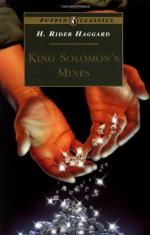At any rate, dropping the tolla, he snatched at the axe, which was fastened to Twala’s wrist by a strip of buffalo hide, and still rolling over and over, they fought for it like wild cats, drawing their breath in heavy gasps. Suddenly the hide string burst, and then, with a great effort, Sir Henry freed himself, the weapon remaining in his hand. Another second and he was upon his feet, the red blood streaming from the wound in his face, and so was Twala. Drawing the heavy tolla from his belt, he reeled straight at Curtis and struck him in the breast. The stab came home true and strong, but whoever it was who made that chain armour, he understood his art, for it withstood the steel. Again Twala struck out with a savage yell, and again the sharp knife rebounded, and Sir Henry went staggering back. Once more Twala came on, and as he came our great Englishman gathered himself together, and swinging the big axe round his head with both hands, hit at him with all his force.
There was a shriek of excitement from a thousand throats, and, behold! Twala’s head seemed to spring from his shoulders: then it fell and came rolling and bounding along the ground towards Ignosi, stopping just as his feet. For a second the corpse stood upright; then with a dull crash it came to the earth, and the gold torque from its neck rolled away across the pavement. As it did so Sir Henry, overpowered by faintness and loss of blood, fell heavily across the body of the dead king.
In a second he was lifted up, and eager hands were pouring water on his face. Another minute, and the grey eyes opened wide.
He was not dead.
Then I, just as the sun sank, stepping to where Twala’s head lay in the dust, unloosed the diamond from the dead brows, and handed it to Ignosi.
“Take it,” I said, “lawful king of the Kukuanas—king by birth and victory.”
Ignosi bound the diadem upon his brows. Then advancing, he placed his foot upon the broad chest of his headless foe and broke out into a chant, or rather a paean of triumph, so beautiful, and yet so utterly savage, that I despair of being able to give an adequate version of his words. Once I heard a scholar with a fine voice read aloud from the Greek poet Homer, and I remember that the sound of the rolling lines seemed to make my blood stand still. Ignosi’s chant, uttered as it was in a language as beautiful and sonorous as the old Greek, produced exactly the same effect on me, although I was exhausted with toil and many emotions.
“Now,” he began, “now our rebellion is swallowed up in victory, and our evil-doing is justified by strength.
“In the morning the oppressors arose and stretched themselves; they bound on their harness and made them ready to war.
“They rose up and tossed their spears: the soldiers called to the captains, ’Come, lead us’—and the captains cried to the king, ’Direct thou the battle.’




